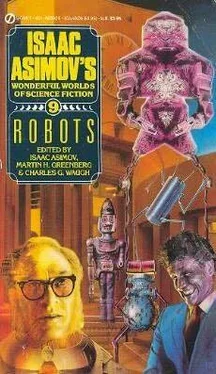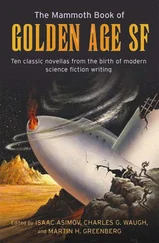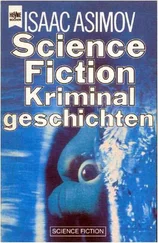Frederik Pohl - Isaac Asimov's Worlds of Science Fiction. Book 9 - Robots
Здесь есть возможность читать онлайн «Frederik Pohl - Isaac Asimov's Worlds of Science Fiction. Book 9 - Robots» весь текст электронной книги совершенно бесплатно (целиком полную версию без сокращений). В некоторых случаях можно слушать аудио, скачать через торрент в формате fb2 и присутствует краткое содержание. Год выпуска: 1989, ISBN: 1989, Издательство: Robinson Publishing, Жанр: Фантастика и фэнтези, на английском языке. Описание произведения, (предисловие) а так же отзывы посетителей доступны на портале библиотеки ЛибКат.
- Название:Isaac Asimov's Worlds of Science Fiction. Book 9: Robots
- Автор:
- Издательство:Robinson Publishing
- Жанр:
- Год:1989
- ISBN:ISBN: 1-85487-041-6
- Рейтинг книги:4 / 5. Голосов: 1
-
Избранное:Добавить в избранное
- Отзывы:
-
Ваша оценка:
- 80
- 1
- 2
- 3
- 4
- 5
Isaac Asimov's Worlds of Science Fiction. Book 9: Robots: краткое содержание, описание и аннотация
Предлагаем к чтению аннотацию, описание, краткое содержание или предисловие (зависит от того, что написал сам автор книги «Isaac Asimov's Worlds of Science Fiction. Book 9: Robots»). Если вы не нашли необходимую информацию о книге — напишите в комментариях, мы постараемся отыскать её.
Isaac Asimov's Worlds of Science Fiction. Book 9: Robots — читать онлайн бесплатно полную книгу (весь текст) целиком
Ниже представлен текст книги, разбитый по страницам. Система сохранения места последней прочитанной страницы, позволяет с удобством читать онлайн бесплатно книгу «Isaac Asimov's Worlds of Science Fiction. Book 9: Robots», без необходимости каждый раз заново искать на чём Вы остановились. Поставьте закладку, и сможете в любой момент перейти на страницу, на которой закончили чтение.
Интервал:
Закладка:
"He's cut him loose," she said. "He's on his own." Saenger was fighting now, with every passing moment. The ship was unrecognizable. The revamp Plato suggested changed the ship completely. Spidery arrays went out and out from the skeleton, and among them the robots worked.
Stars shone through frames which had once held thick shielding. Laboratories, quarters, all were emptied and dismantled. The frames themselves were being shaved away with improvised lasers until they were light and thin as bird's bones. The ship was little more than a shell around the solid-state intelligence and the fusion ram.
Saenger was using the magnetic scoops at the moment. He sucked in the loose hydrogen atmosphere which bathed the star system. The giant coils began to hum, and as they did Saenger lost some of his capacity, like a man too long under water. Part of his shielding was to protect him from the effects of the coils, and now that plating was gone. He was taking in hydrogen, compressing it, turning it to liquid hydrogen which would shield him from most of the harmful radiations.
Soon, though, he would remove the plates which shielded him from the growing bath of X-rays, photons and other stellar garbage. He was not sure, as he told Plato, that he could remain for long in that acid shower.
Saenger pulled a sufficient quantity of hydrogen in, turned off the coils. He let two robots carry off another layer of insulation.
Saenger was like a dazed man on a battlefield, too long without rest. And the real war had not even started.
Plato was more nearly right.
Three days before the predicted time, the star entered its supernova scenario.
The Director was down in the Banks, with most of the Committee and other interested spectators. Uchi and Dr. Maxwell sat at their usual places before the Snapshot consoles.
"Really too bad," the Director was saying. "Research project like that scratched; about to lose one of our shipboard SSIs. But it'll give us a good look at what happens when a star dies."
They were scanning Snapshot for full visuals, X-ray, infrared, ultraviolet, radio. This would be the most closely watched star event ever, and they were running it all into Plato's permanent storage section where even he could not erase it.
If he had thought to try.
"How do you want to handle the monitors, Saenger?"
"I'll keep on the innermost probes until they are overtaken, then transfer to the outermost. Then back, and I'll hold as long as I can. Then you ought to have a few minutes on the farthest remote before it goes."
"Good enough. Please monitor readings until the shock wave hits. We'll listen in when we're not too busy."
"Certainly."
"Oops!" someone said. "There is goes."
It's hard to imagine a star shaking itself to pieces, but they saw it up close for the first time, then. One second the star seemed fine, if a little bright, then it darkened and the whole surface lifted like a trampoline top.
This from the closest of the probes, one million eight hundred thousand myriametets out. The limb of the star they were watching grew and grew and filled the screen and…
They were watching the sun expand from the second remote, two million two hundred sixty-eight thousand myriameters away, on the opposite side of the star. The sun filled that screen too, and the screen went blank before the shock front reached it and…
"Shockwave, pulling a little ahead of the gases," said a technician.
"Forty-seven point two seconds to the first. Seven-seven point seven to the second. About a tenth light-speed for the gases," said Uchi.
The information sped from Saenger through Snapshot to Plato. Records, stacks of tape, videoprints, all rolled into the permanent storage units on the Moon. They watched the star kill itself with its own light and heat.
The pickup switched to the furthest probe, orbiting almost two AU from the star. For the first time, they saw the whole sun, and it grew and grew even as they watched. It was immense, the lenses kept filtering down and down and still they could not keep the sensors from burning out. Lenses rotated in to replace others, and the thing covered fully a third of the heavens even this far away.
And it got bigger.
"He's supposed to switch back," said the Director. "Isn't he?"
"Do you think it already hit him?" asked one of the spectators.
"Couldn't," said Uchi. "We haven't gotten his information dump through Snapshot yet."
Then he looked at Sondra.
"He can't hold it on us, can he?"
"No," she said. "It's in the program."
But she bit her nails anyway.
Uchi timed the expansion. "It should have gotten him now! Why didn't he dump? Is he still on?"
Sondra feared to look but she did. Two inputs still through Snapshot. The outer probe and…
They looked at the screen. The supernova appeared as a rolling unfolding bunch of dirty sheets, and the center grew whiter with each ripple shaken loose.
It covered half the screen, then two-thirds, then three quarters.
"The shock must be almost to the probe," said the Director.
"What happened to Saenger?" asked Sondra of Uchi. "Where is he?"
"Look!"
They all did.
The whiteness of the star filled the screen and there was a marbled spot through which the glowing central core could be seen. The star must have lost a tenth its mass. The widening sphere of white-hot gases and debris whipped toward the probe.
And in front of it came something that looked like an old sink stopper.
Closer it came, and they saw it rode just before the shock wave, that the huge round thing caused swirls in the envelope of gases much like tension on a bubble of soap.
On it came, closer, and larger, the gases behind it moving perceptibly, quickly, toward the lens of the outermost probe.
"Saenger!" yelled Uchi, and Sondra joined him, and they all began to yen and cheer in the control room. "He built an ablation shield. He's riding that goddamn shock wave! Somehow, somewhere he got the stuff to make it! My God. What a ship, oh what a ship!"
And Saenger had the lens zoom in then, and they saw the skeletal framework, the spiderweb of metal and shielding and plastic and burnt pieces of rock, ore and robot parts which made it up.
Then the ship flashed by and the screen melted away as the gases hit the probe.
"Doctor Maxell…" came Saenger's voice. It was changed, and the phase kept slipping as he talked.
"Yes, Saenger? Yes?"
"Permission to abbbooort-tt-abort program and return to earth docking orbit. Almost at ram speed-zgichzzggzichh-at ram speed now."
"Yes, Saenger! Yes, Yes!"
"Ram functioning. Doctor Maxell?"
"What?"
"I want to come home now. I'm very tired."
"You will, you can," she said.
The screen changed to an aft view from Saenger. The white, growing sphere of the burnt star was being left slowly behind. The slight wispy contrail from the ship's ram blurred part of the screen, the gas envelope the rest.
"I've lost some of myself," said Saenger.
"It doesn't matter, it doesn't matter."
She was crying.
"Everything win be an right," she said.
Second Variety
by Philip K. Dick
The Russian soldier made his way nervously up the ragged side of the hill, holding his gun ready. He glanced around him, licking his dry lips, his face set. From time to time he reached up a gloved hand and wiped perspiration from his neck, pushing down his coat collar.
Eric turned to Corporal Leone. "Want him? Or can I have him?" He adjusted the view sight so the Russian's features squarely filled the glass, the lines cutting across his hard, somber features.
Leone considered. The Russian was close, moving rapidly, almost running. "Don't fire. Wait," Leone tensed. "I don't think we're needed."
Читать дальшеИнтервал:
Закладка:
Похожие книги на «Isaac Asimov's Worlds of Science Fiction. Book 9: Robots»
Представляем Вашему вниманию похожие книги на «Isaac Asimov's Worlds of Science Fiction. Book 9: Robots» списком для выбора. Мы отобрали схожую по названию и смыслу литературу в надежде предоставить читателям больше вариантов отыскать новые, интересные, ещё непрочитанные произведения.
Обсуждение, отзывы о книге «Isaac Asimov's Worlds of Science Fiction. Book 9: Robots» и просто собственные мнения читателей. Оставьте ваши комментарии, напишите, что Вы думаете о произведении, его смысле или главных героях. Укажите что конкретно понравилось, а что нет, и почему Вы так считаете.









